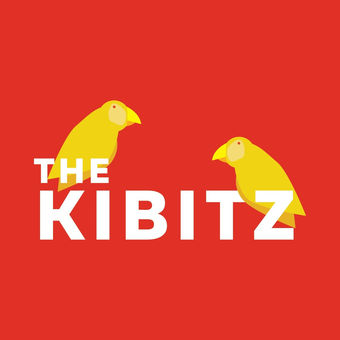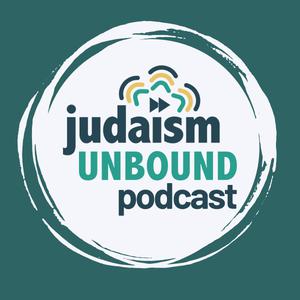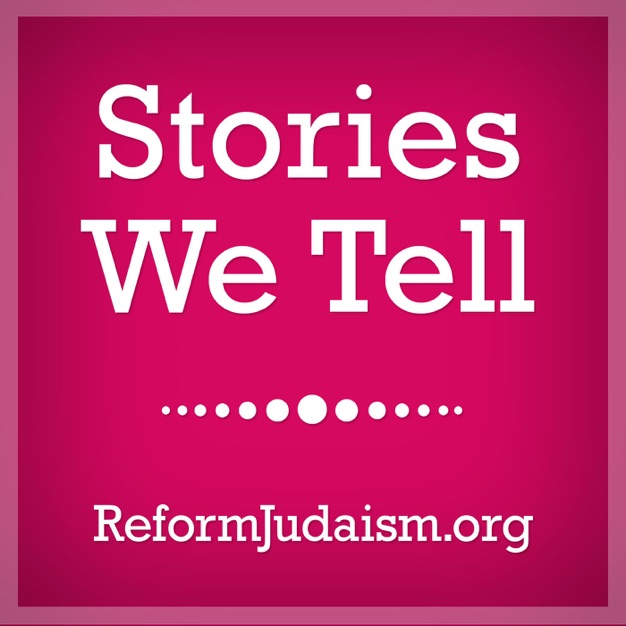
Can We Talk?
Jewish Women's Archive
Each month on Can We Talk?, the Jewish Women’s Archive features stories and conversations about Jewish women and the issues that shape our public and private lives. Alternating between a documentary style and a roundtable format, Can We Talk? includes profiles of historical and contemporary Jewish women, frank discussion of culture, politics, and current events, and little-known stories from our past and present. Contact us at [email protected]. Tell us what you think of the podcast! Take our survey at https://jwa.org/podcastsurvey.
- 24 minutes 57 secondsEpisode 121: Alaska's Jewish Pioneer Daughter
On August 4, 1869, a Jewish baby girl named Josie became Alaska’s first pioneer daughter. Josephine Rudolph was born in Sitka, Alaska to German immigrants, and returned to Germany when she was 6 years old. Seven decades later, her American birth saved her life when the Nazis came to power.
Josie’s story takes us from the muddy frontier town of Sitka to Hitler youth parades in Nazi Germany and finally to postwar New York, where her family tried to find their place. It's a remarkable tale of the survival of one Jewish woman and her family, but it's also part of a much bigger story—about antisemitism, refugees, and settlement, about who belongs, and where.
First we'll hear from Tom Kizzia, the journalist who reported Josie's story, and then from Susie Hoffman and Amy Weiss, Josie's great-granddaughters.
You can find Can We Talk? on Apple Podcasts, Spotify, or your favorite podcast app. We're also on YouTube! Don't forget to subscribe so you never miss a new episode.
Love Can We Talk? Please leave us a rating and review on Apple Podcasts. You can also drop us a line and let us know what you think or suggest ideas for future episodes. We just might read your email on the air!
Want even more Can We Talk? Sign up for our monthly newsletter.
16 December 2024, 4:05 pm - 25 minutes 2 secondsEpisode 120: Until 120!
It’s a Can We Talk? party! Welcome to our 120th episode 🥳. We're celebrating this milestone podcast style—Jen gets Judith and Nahanni reminiscing about the early days, we revisit clips from some of our favorite episodes, and we hear "Until 120!" in six languages. We’re honored to be feted by some very special past guests and fans of Can We Talk?, including Susan Stamberg of NPR, comedians Judy Gold and Iris Bahr, actor Eleanor Reissa, singers Galeet Dardashti and Erez Zobary, Noah Efron of The Promised Podcast, and our own daughters.
You can find Can We Talk? on Apple Podcasts, Spotify, or your favorite podcast app. We're also on YouTube! Don't forget to subscribe so you never miss a new episode.
Love Can We Talk? Please leave us a rating and review on Apple Podcasts. You can also drop us a line and let us know what you think or suggest ideas for future episodes. We just might read your email on the air!
Want even more Can We Talk? Sign up for our monthly newsletter.
19 November 2024, 3:18 pm - 19 minutes 54 secondsEpisode 119: Erez Zobary Sings Her Yemenite Roots
Toronto R & B musician Erez Zobary was always proud of her Yemenite Jewish identity, but didn't explore it in her music - until now. Her new album, Erez, is a soulful, personal collection of songs that draws on her family's stories of life in Yemen and Israel. In this episode of Can We Talk?, Erez helps us kick off Mizrahi Heritage Month, when we celebrate the cultures and contributions of Jews from the Middle East, North Africa, and Central Asia. Erez talks about her family story, the troubled history of Yemenite Jews in Israel, and her feelings about her identity—and we hear songs from her brand new album.
You can find Can We Talk? on Apple Podcasts, Spotify, or your favorite podcast app. We're also on YouTube! Don't forget to subscribe so you never miss a new episode.
Love Can We Talk? Please leave us a rating and review on Apple Podcasts. You can also drop us a line and let us know what you think or suggest ideas for future episodes. We just might read your email on the air!
Want even more Can We Talk? Sign up for our monthly newsletter.
1 November 2024, 4:00 pm - 19 minutes 59 secondsEpisode 118: The Femme Fatale in the Sukkah
This Sukkot, we're welcoming a special guest into Can We Talk?’s virtual sukkah: the Talmudic “femme fatale” Homa, one of the women featured in her new book, The Madwoman in the Rabbi's Attic. In this episode, Talmud scholar Gila Fine tells Homa’s story, reinterprets it from Homa’s perspective, and explains why she thinks Homa makes a fitting symbolic guest for Sukkot.
You can find Can We Talk? on Apple Podcasts, Spotify, or your favorite podcast app. We're also now on YouTube! Don't forget to subscribe so you never miss a new episode.
Love Can We Talk? Please leave us a rating and review on Apple Podcasts. You can also drop us a line and let us know what you think or suggest ideas for future episodes. We just might read your email on the air!
Want even more Can We Talk? Sign up for our monthly newsletter.
22 October 2024, 2:08 pm - 24 minutes 2 secondsEpisode 117: One Year Later
A year after Hamas’ brutal October 7 attacks on Israel, the war is far from over. Israel is fighting on multiple fronts—with Hamas in Gaza, with Hezbollah in Lebanon—while war threatens to explode with Iran. Hamas is still holding 101 hostages in Gaza, 33 of whom have been confirmed dead by the IDF. In this episode of Can We Talk?, three Israeli women—Lee Hoffman Agiv, Stav Salpeter, and Ruby Russell—share thoughts about marking the first anniversary of the attacks in the midst of an ongoing and escalating war. We also speak with Dr. Melila Hellner-Eshed, Hebrew University professor of Zohar and Jewish mysticism, who discusses atonement and redemption and what her Israeli-Palestinian dialogue group has meant to her during the past year.
You can find Can We Talk? on Apple Podcasts, Spotify, or your favorite podcast app. We're also now on YouTube! Don't forget to subscribe so you never miss a new episode.
Love Can We Talk? Please leave us a rating and review on Apple Podcasts. You can also drop us a line and let us know what you think or suggest ideas for future episodes. We just might read your email on the air!
Want even more Can We Talk? Sign up for our monthly newsletter.
7 October 2024, 1:35 pm - 23 minutes 27 secondsEpisode 116: Jean Carroll, First Lady of Laughs
Before Joan Rivers, there was another Jewish woman who broke ground as a stand-up comedian. Her name was Jean Carroll, and although she was a household name in the 50s and 60s, today she has been mostly forgotten. Grace Kessler Overbeke hopes her new book about Jean Carroll, First Lady of Laughs, will change that. In this episode of Can We Talk?, we talk to Grace about why Jean Carroll deserves to be remembered for changing both the face of comedy and people's ideas about what a Jewish woman could be.
You can find Can We Talk? on Apple Podcasts, Spotify, or your favorite podcast app. We're also now on YouTube! Don't forget to subscribe so you never miss a new episode.
Love Can We Talk? Please leave us a rating and review on Apple Podcasts. You can also drop us a line and let us know what you think or suggest ideas for future episodes. We just might read your email on the air!
Want even more Can We Talk? Sign up for our monthly newsletter.
24 September 2024, 1:45 pm - 22 minutes 4 secondsEpisode 115: Dr. Ruth's Radical Legacy
The iconic Dr. Ruth Westheimer died earlier this year at the age of 96. Dr. Ruth was a trailblazer for her candid and joyful talk about sex, regularly using words like "masturbate" and "vibrator" on the air, and talking about sexual pleasure— including women's sexual pleasure—at a time when few others did. In this episode of Can We Talk?, we remember and celebrate Dr. Ruth. Historian and author Rebecca Davis explores Dr. Ruth's radical legacy and actress Tovah Feldshuh reflects on their friendship. Plus, archival tape of Dr. Ruth herself dishing out sex advice to her devoted listeners.
You can find Can We Talk? on Apple Podcasts, Spotify, or your favorite podcast app. We're also now on YouTube! Don't forget to subscribe so you never miss a new episode.
Love Can We Talk? Please leave us a rating and review on Apple Podcasts. You can also drop us a line and let us know what you think or suggest ideas for future episodes. We just might read your email on the air!
Want even more Can We Talk? Sign up for our monthly newsletter.
10 September 2024, 2:00 pm - 20 minutes 22 secondsBonus Episode: A Visit to Pine Ridge Reservation
In this bonus episode, Nahanni Rous shares stories from a trip to the Pine Ridge Indian Reservation in South Dakota. Nahanni visits a solar energy training center, a skateboarding competition, and the annual Oglala Nation powwow, and meets people who are trying to build a better future, both by innovating and by reclaiming tradition.
You can find Can We Talk? on Apple Podcasts, Spotify, or your favorite podcast app. We're also now on YouTube! Don't forget to subscribe so you never miss a new episode.
Love Can We Talk? Please leave us a rating and review on Apple Podcasts. You can also drop us a line and let us know what you think or suggest ideas for future episodes. We just might read your email on the air!
Want even more Can We Talk? Sign up for our monthly newsletter.
19 August 2024, 6:26 pm - 27 minutes 17 secondsEpisode 114: Can We Talk? 2023-24 Season Wrap
In this episode of Can We Talk?, Jen, Nahanni, and Judith recap the past two seasons of the podcast, in which we entered the uncharted territory of a post-October 7 world. We discuss our approach to creating episodes about Jewish women’s responses to the attack on Israel and the ensuing war in Gaza, while still making space to tell stories about other aspects of Jewish life.
You can find Can We Talk? on Apple Podcasts, Spotify, or your favorite podcast app. We're also now on YouTube! Don't forget to subscribe so you never miss a new episode.
Love Can We Talk? Please leave us a rating and review on Apple Podcasts. You can also drop us a line and let us know what you think or suggest ideas for future episodes. We just might read your email on the air!
Want even more Can We Talk? Sign up for our monthly newsletter.
25 June 2024, 3:00 pm - 29 minutes 32 secondsEpisode 113: Getting Out Of Gaza
Since Hamas’s brutal attack on Israeli civilians on October 7, Can We Talk? has focused on Israeli women’s responses to the war. In this episode, we turn our attention to Gaza, where Israel’s sustained bombardment has taken a terrible toll—tens of thousands of people have been killed, nearly two million people have been displaced, and the medical system is in ruins.
Over a hundred thousand Palestinians have fled Gaza for Egypt in the past eight months. Human rights activist Jen Marlowe has been raising money and working to help people with the expensive, bureaucratic and logistically complicated border crossing. In this episode of Can We Talk?, we speak to Jen about her recent trip to Egypt to meet with some of the people she has helped get to safety, the conditions people face in Gaza, and what it’s like for her, a Jewish woman, to do this work.
You can find Can We Talk? on Apple Podcasts, Spotify, or your favorite podcast app. We're also now on YouTube! Don't forget to subscribe so you never miss a new episode!
Love Can We Talk? Please leave us a rating and review on Apple Podcasts. You can also drop us a line and let us know what you think or suggest ideas for future episodes. We just might read your email on the air!
Want even more Can We Talk? Sign up for our monthly newsletter at jwa.org/signup
11 June 2024, 1:09 pm - 16 minutes 57 secondsEpisode 112: Oral History Showcase: Mollie's Fight for Gay Rights
Dr. Mollie Wallick didn't set out to be a gay rights activist; she stumbled into the role in 1983, when she was a guidance counselor at Louisiana State University’s medical school in New Orleans. In this episode of Can We Talk?, you’ll hear excerpts from Mollie’s 2005 interview for the “Women Who Dared” oral history project. As we kick off Pride Month, Mollie’s story reminds us how much has changed in just a few decades—language, attitudes, and policies. And it offers a glimpse of what it was like to be an advocate for gay students at a time when their school, and society in general, offered few resources and many obstacles.
You can find Can We Talk? on Apple Podcasts, Spotify, or your favorite podcast app. We're also now on YouTube! Don't forget to subscribe so you never miss a new episode!
Love Can We Talk? Please leave us a rating and review on Apple Podcasts. You can also drop us a line and let us know what you think or suggest ideas for future episodes. We just might read your email on the air!
Want even more Can We Talk? Sign up for our monthly newsletter at jwa.org/signup
28 May 2024, 4:00 pm - More Episodes? Get the App
Your feedback is valuable to us. Should you encounter any bugs, glitches, lack of functionality or other problems, please email us on [email protected] or join Moon.FM Telegram Group where you can talk directly to the dev team who are happy to answer any queries.
 The Kibitz Podcast
The Kibitz Podcast
 On the Other Hand: Ten Minutes of Torah
On the Other Hand: Ten Minutes of Torah
 Judaism Unbound
Judaism Unbound
 Stories We Tell
Stories We Tell
 Talking in Shul - Jewish Public Media
Talking in Shul - Jewish Public Media
 The Joy of Text - Jewish Public Media
The Joy of Text - Jewish Public Media